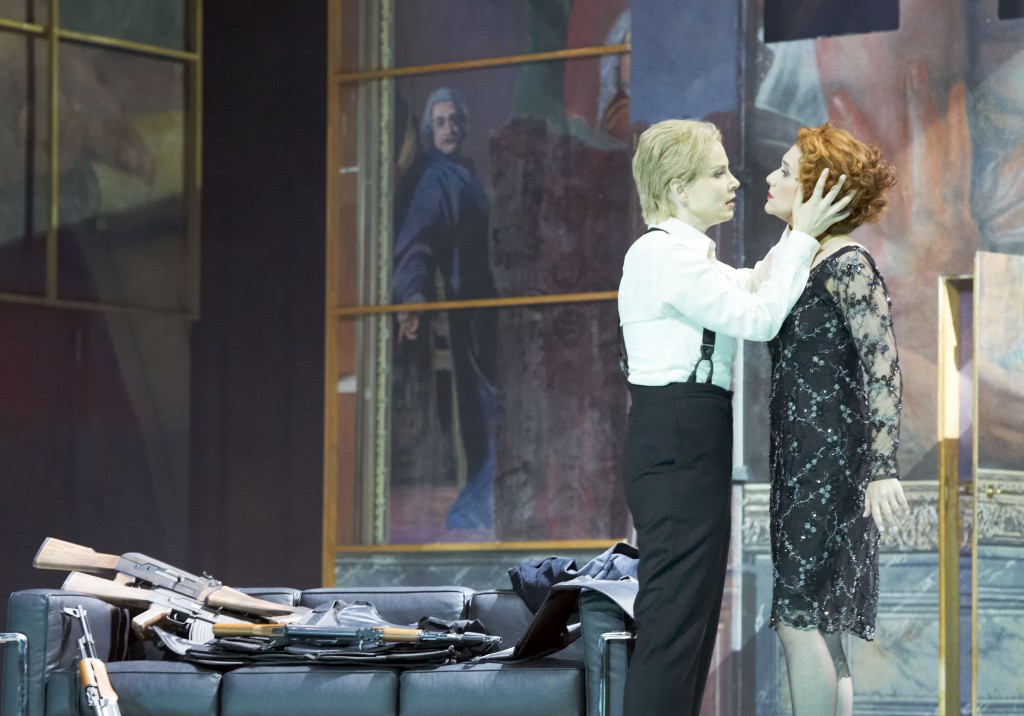 On the morning of the premiere of La Clemenza di Tito at Vienna State Opera, I happened to hear an interview on Austrian Radio with soprano Chen Reiss. Reiss is cast as Servilia, whom new Emperor Tito intends to marry (as a gesture of friendship to her brother Sesto).Servilia may seem a ‘small’ part, but Reiss contends, in opera roles are neither ‘short’ or ‘long’. Certainly Reiss, in a sparkling purple shift, had maximum impact in a relatively brief appearance in Act 1. Servilia refuses to accept Tito, though Annio is prepared to submit to the Emperor. In a tremendous aria she confirms her love for Annio: ‘Love is the only thing that truly matters in life’. Reiss’s’s powerful rendition is convincing enough to persuade Tito renounce his intention, and encourage the lovers.
On the morning of the premiere of La Clemenza di Tito at Vienna State Opera, I happened to hear an interview on Austrian Radio with soprano Chen Reiss. Reiss is cast as Servilia, whom new Emperor Tito intends to marry (as a gesture of friendship to her brother Sesto).Servilia may seem a ‘small’ part, but Reiss contends, in opera roles are neither ‘short’ or ‘long’. Certainly Reiss, in a sparkling purple shift, had maximum impact in a relatively brief appearance in Act 1. Servilia refuses to accept Tito, though Annio is prepared to submit to the Emperor. In a tremendous aria she confirms her love for Annio: ‘Love is the only thing that truly matters in life’. Reiss’s’s powerful rendition is convincing enough to persuade Tito renounce his intention, and encourage the lovers.
Reiss is one of a dazzling cast, inevitably eclipsed by the longer roles. Vitellia (Juliane Banse) is the daughter of the overthrown Emperor. Vitellia exploits Sesto’s love for her, offering her favours, should he join a conspiracy to kill Tito. Sesto (Sextus) is in fact played by mezzo Elina Garanca, and these two powerful singers vie for our applause, especially Garanca. As Tito, Michael Schade is refined, stylish, a rich, fulsome tenor. Tito is Mozart’s benevolent (‘Enlightened’) ruler , ‘the sole desire of the sovereign is to do good. The rest is torment’, he sings (to warm applause.)
Juliane Banse, red-haired, and a stunning presence in tight black lace dress (Versace inspired?), rages with passion, threatening the day Tito’s blood will run .’Is the Capital aflame yet’, she asks failed Sesto: ‘Get out of my sight!’ Sesto pleads, to a sublime clarinet accompaniment, let us part as friends. In a key aria, Garanca (cross-dressed) in a black waistcoat-trouser outfit, ballooning white shirt, insists ‘Look at me! I promise I will avenge you’. There was huge applause.
 Banse’s Vitellia is also impressive (in a later aria) bemoaning her accursed rage, ill-fated fury. She feels great joy, but frozen with fright. The revolt begun, Vitellia tries to stop Sesto, who returns convinced he’s killed Tito. The Chorus come in, lamenting the death of the benevolent Emperor, lined up in black suits, with music stands and scores. ‘What a heinous crime. What a day of grief!’ (Sesto and Vitellia, meanwhile, sit disconsolately, side-by side on a chaise- longue.)
Banse’s Vitellia is also impressive (in a later aria) bemoaning her accursed rage, ill-fated fury. She feels great joy, but frozen with fright. The revolt begun, Vitellia tries to stop Sesto, who returns convinced he’s killed Tito. The Chorus come in, lamenting the death of the benevolent Emperor, lined up in black suits, with music stands and scores. ‘What a heinous crime. What a day of grief!’ (Sesto and Vitellia, meanwhile, sit disconsolately, side-by side on a chaise- longue.)
Act 2 opens to a messy stage with all sorts of props scattered about, like a trashed lounge, perhaps to symbolise Sesto’s chaotic state of mind? (Annio reports to the depressed Sesto, that the Emperor is unharmed). But Mozart’s music shines through the dry ice and Jurgen Flymm’s opaque direction (booed curtain-up.) To an oboe intro, Sesto sings of a gentle breeze caressing his face: this will be his last breath. In a magnificent group ensemble Sesto confesses. Vitellia urges him to flee , while the Chorus in the background ironically gives thanks for the saving of Tito. Annio ( mezzo Serena Malfi) advises Sesto to trust in Tito; though betrayed, and Sesto should die, the Emperor has a compassionate heart.
Tito is enraged: at first feels the villain must die, but relents, bemoaning the sad fate of the ruler torn between rage and friendship. In a dramatic scene, Sesto, prepared to die , will not reveal his secret. Nevertheless Tito, bemused, revokes the death sentence.
Mozart’s opera is about betrayal and loyalty. Schade, in black with a white cotton jacket- like a psychiatrist- appeals to Sesto to confide in his friend. Ultimately Sesto, remorseful, appeals to Tito’s frienship; Tito’s hostility is punishment enough to make him die an agonising death. Garanca’s performance won loud bravos.
 Tito knows Sesto is guilty, but if he ‘can only rule with a heart of steel, then take away my realm, or give me another heart. Loyalty means nothing if it is founded on fear, not love’, (Schade heavily applauded).
Tito knows Sesto is guilty, but if he ‘can only rule with a heart of steel, then take away my realm, or give me another heart. Loyalty means nothing if it is founded on fear, not love’, (Schade heavily applauded).
The message is that of the ‘Enlightened’ ruler. Mozart’s Tito is echoing the (eighteenth Century) Age of Enlightenment model of benevolent ruler. Schade is seen picking up scattered sheets of paper: are they manifestos?
It’s time for Vitellia- Banse again stunning- to prove her strength of character. She will go to to Tito and confess everything. Farewell her hopes of marriage (‘Never will the godess of marriage descend…’) And finally Sesto is led in blindfolded. The chorus behind him affirm ‘This day shows Tito a favourite of the gods.’ Vitellia is at his feet, admitting she neglected by him, sought revenge.
The closure of Mozart’s opera, though ‘drama seria’ resonnates with the reconciliation of ‘comedy’. Tito , betrayed by all, will not be avenged, but lets the conspirators go free. Tito bemoans the faithlessness of his subjects; but ‘Rome must know that he is omniscient, yet forgiving’.
Mozart’s ending is ambivalent. Sesto appears penitent: (‘Historical penitence is worth more than blemished loyalty’). Tito reaffirms Rome’s happiness is his supreme aspiration. Yet Mozart is a master of human psycholology. In the apparently conciliatory ending, the Chorus intone, ‘Protect him , oh eternal gods’,
This Vienna State Opera Cast was so good it’s hard to choose any one soloist , except for Garanca, who won on applause. Schade and Banse were impressive; also Malfi as Annio, and baritone Adam Plachetka’s Publio (Plachetka recently Figaro in House). It’s a shame, however, about the sets – hanging walls with collage-effect, vaguely period pastiche. Notwithstanding, high musical values prevailed. Louis Langree conducting a smaller, ‘period’ sized Vienna State Opera Orchestra, justified Mozart’s sublime music, eliciting outstanding, and sympathetic solos , especially from the woodwind section, (clarinet,oboe). Why, asked Chen Reiss, considering La Clemenza was such a hit (premiered 1791) is the opera so relatively neglected?
Those listening live on Austrian Radio would have heard an exemplary performance. Subsequent, different casts may attain these heights. Sadly, Vienna State Opera are stuck with George Tsypin’s flimsy, ramshackle, sub-standard sets.
17.05.2012
Photos: Elina Garanca (Sesto) and Juliane Banse (Vitellia); Juliane Banse (Vitellia) and Serena Malfi (Annio); Michael Schade (Tito)
(c) Wiener Staatsoper / Michael Pöhn
viennaoperareview.com
Vienna's English opera blog
